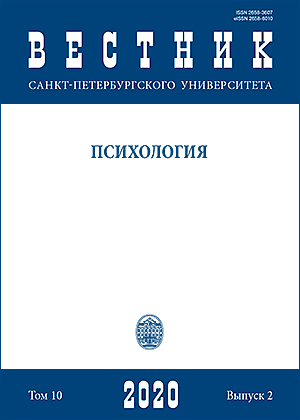The attitude of young people toward gender attitudes, which are transmitted by influential leaders of the Russian-speaking YouTube segment
DOI:
https://doi.org/10.21638/spbu16.2020.203Abstract
Despite the large number of studies on the characteristics of different generations, most often they are in a sociological or demographic field, while psychological research on this topic is not sufficient. Modern young people, identified according to the theory of Hove and Strauss the “generation Z” or the digital generation, are characterized by a decrease in the significance of their parents’ experience and the search for information among peers in social networks. Among the participants organizing communications in social networks, there are individual users whose opinions and knowledge become a source of information for others. These users are called influencers or opinion leaders. It is assumed that under the influence of opinion leaders, the world view and value system of young people can be established. This article is devoted to the study of gender attitudes transmitted by opinion leaders in the youth environment, and the attitude of young people towards them. We study the consistency of gender (as one of the most important for this age) attitudes of young people with the gender attitudes of opinion leaders on social networks. The sample for the study consisted of 191 people aged 16–18 years. The study was conducted using the methods of content analysis, the author’s questionnaire and questionnaires “I am a woman (man)” by L.N.Ozhigova (2003), the questionnaire “Attitudes toward Sex” by Eysenck (1989), the Schwarz values questionnaire (adapt. by Karandashev, 2004). The results obtained demonstrate that the most popular channels among young people are entertainment channels. The authors of these channels broad-cast contradictory gender attitudes in their releases, in which gender stereotypes are often manifested. It was revealed that the gender attitudes of authors and their audience are similar: the authors’ broadcast and the audience demonstrate conflicting attitudes in their judgments. Also, it has been shown that young people who are characterized by conforming behavior and are susceptible to influence more often agree with the opinions broadcast by the authors of channels. This study does not allow for a conclusion to be made on whether the gender attitudes of young people were formed by popular authors, or were originally such.This aspect is a promising field of research.
Keywords:
opinion leaders, influencers, generation Z, young people, gender attitudes, social networks, YouTube
Downloads
References
References
Downloads
Published
How to Cite
Issue
Section
License
Articles of "Vestnik of Saint Petersburg University. Psychology" are open access distributed under the terms of the License Agreement with Saint Petersburg State University, which permits to the authors unrestricted distribution and self-archiving free of charge.




